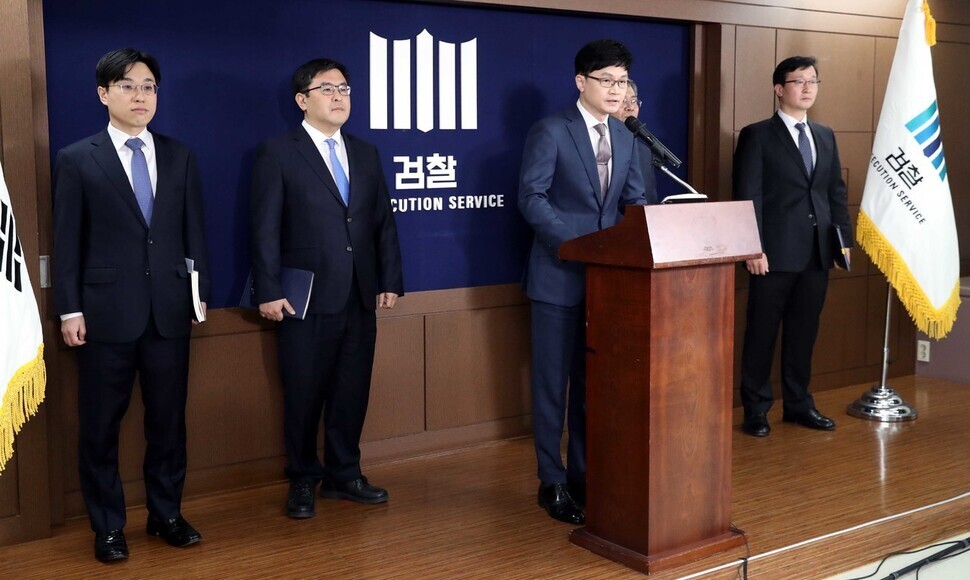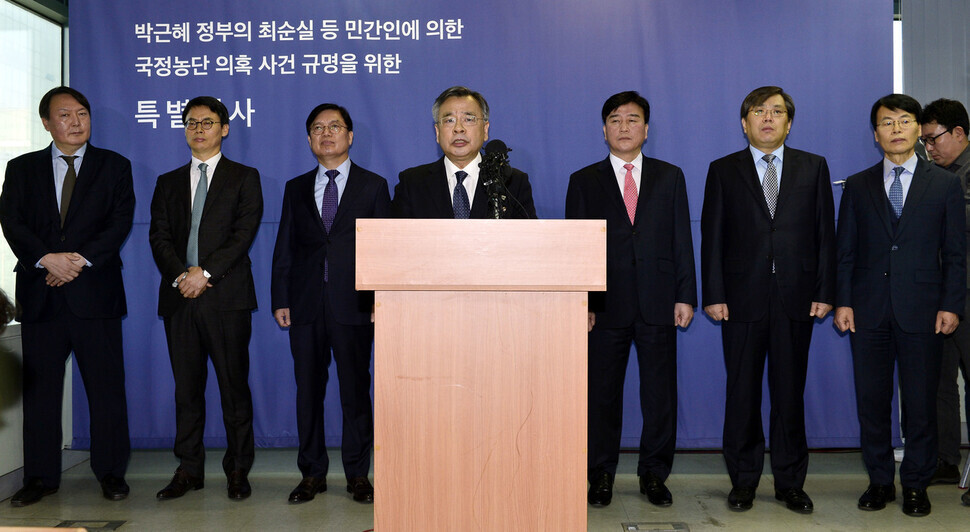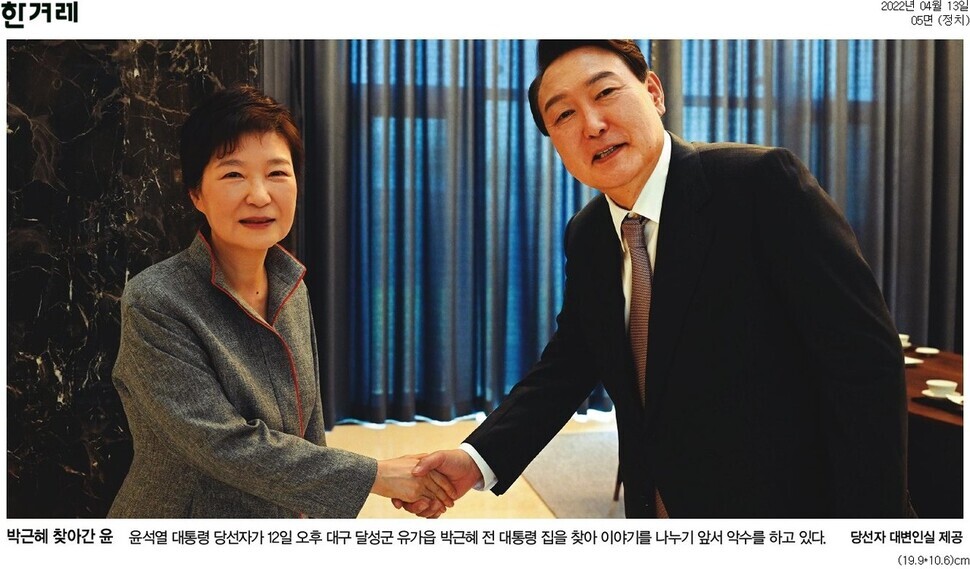hankyoreh
Links to other country sites 다른 나라 사이트 링크
The rise of Korea’s cowardly prosecutor-politicians

On Jan. 26, the Seoul Central District Court found former Supreme Court Chief Justice Yang Seung-tae, as well as former justices Park Byung-dae and Ko Young-han, not guilty on more than 40 charges, mostly related to abuse of judicial authority.
Shortly after the verdict, the activist group People's Solidarity for Participatory Democracy lambasted the verdict as a “prime example of the judicial system protecting its own that will go down in history as a mockery of justice.”
The district court announced that it would make a decision on whether or not to accept an appeal after “thoroughly dissecting the proven facts and relevant jurisprudence,” offering nothing more than the typical statements.
If prosecutors decide to make an appeal, however, a second trial will begin. Depending on the outcome of that trial, prosecutors or the defendants may take the case to a higher court, leading to a Supreme Court decision that will decide the innocence or guilt of the defendants.
Who is leading the investigation into judicial abuse?
“Yang Seung-tae found not guilty of judicial abuse in initial verdict… Were prosecutors overreaching in their investigations?” (Dong-a Ilbo)
“Judiciary abuse narrative crafted by Moon Jae-in and Kim Myeong-su. Who’s going to take accountability for such a farce?” (Chosun Ilbo)
“A 5-year, overreaching investigation that shook the whole country” (Joongang Ilbo)
“Court finds Yang Seung-tae not guilty on all 47 charges, a case of the judicial system protecting its own” (Hankyoreh)
The Dong-a Ilbo and the Joongang Ilbo claimed that prosecutors overreached in their investigations from the beginning. The Hankyoreh and the Hankook Ilbo questioned the legitimacy of the verdict, asserting that perhaps the judicial branch was protecting its own.
Particularly notable was a Chosun Ilbo editorial. The paper’s editorial board labels the accusations of judiciary abuse as “a fictional narrative,” and claims that the ultimate responsibility lies not with prosecutors but with former President Moon Jae-in and former Supreme Court Chief Justice Kim Myeong-su, who was appointed by Moon. The editorial states, “The courts, under Kim Myeong-su, provided prosecutors with inside information. For the next five months, prosecutors, led by then Prosecutor General Yoon Suk-yeol and his trusted deputy Han Dong-hoon, mobilized 50 prosecutors in a witch hunt investigation.” This is an interesting assertion, as it implies that Yoon and Han were nothing more than loyal servants to Moon and Kim.
As those who spearheaded investigations and drafted indictments for the defendants, how do Yoon and Han, who are now respectively the president and the interim leader of the ruling People Power Party, feel about the court’s verdict? Both Yoon and the presidential office are keeping their mouths shut. When reporters questioned Han on his way to work on Jan. 29, this was his response:
“That investigation was essentially one that was commissioned by the Supreme Court. As someone who was thrown into the investigation after it’d already started, and as someone who has since left that position, I don’t think it’s proper for me to offer an official comment. It’s a case with many variables to think about, and will produce a variety of analyses in the future.”
What does this mean? He said the investigation was essentially “commissioned” by the Supreme Court. Moreover, he refused to offer an opinion on the case because he is no longer a prosecutor. Basically, he sidestepped the question. It’s a complete 180 in demeanor from five years ago, when he proudly announced the investigation into judiciary abuse as a prosecutor.

What happened to “let the public decide”?
On Feb. 11, 2019, Han stood in front of reporters gathered in front of the Seoul Central District Prosecutors’ Office. He had been appointed to lead the investigation. The four deputy department heads of the special investigations bureau lined up behind him during the press conference. A look at the photos will reveal a fierce look in his eyes. This is what he said.
“Media reports in March 2017 regarding a blacklist of judges made the people of Korea suspicious about the National Court Administration and judiciary abuses. Three internal probes by the Supreme Court revealed 410 problematic documents, which were made public. Within that time period, prosecutors received a number of tip-offs and calls from the public for a thorough investigation into the truth. After the Supreme Court agreed to cooperate in a prosecutorial investigation in June 2018, the special investigations department of the Seoul Central District Prosecutors’ Office was tasked with the investigation. We arrested and questioned Im Jong-heon, former assistant director of the National Court Administration, on Oct. 27, 2018, and former Supreme Court Chief Justice Yang Seung-tae on Jan. 24, 2019. Based on our investigations, we indicted Yang for meddling with verdicts regarding compensation for victims of forced mobilization under the Japanese occupation, for threatening judges with retaliatory consequences if they ruled unfavorably toward the judicial branch, and for covering up corruption within the judicial branch. He was charged with abuse of authority, leaking confidential information, counterfeiting legal documents, dereliction of duty, and violating laws calling for the aggravated punishment of economic crimes.”
Han also engaged in the following exchanges with reporters.
Q: Even with prosecutors, the top heads usually get involved in high-profile cases. With the courts, however, every judge is his or her own person, so isn’t it impossible to push through anything unilaterally?
Han: ”The judicial system is all about process. Interfering with a case or verdict is illegal.”
Q: You’ve had your conflicts with judges before. Care to comment?
Han: “The most important thing is that the result is in line with the law and common sense.”
Q: This is a major investigation. What is the significance of this investigation?
Han: “That’s for the public to decide.”
So where did this chest-thumping confidence go? Five years later, the same Han is pussyfooting around questions regarding the same investigation, giving lame excuses for his lack of an answer. The confidence and ferocity with which Han announced the investigations and indictments five years ago reflect the real Han Dong-hoon.
Now, he needs to either critique the not-guilty verdict or come clean and apologize — admit that the investigations and indictments were illegitimate from the beginning. Just because his official title and place of work have changed, he avoids the question altogether like a coward?
In a Jan. 31 editorial titled, “Was the whole judiciary abuse investigation a commissioned probe?” the Hankyoreh went after Han. People in the legal profession have a saying, “Prosecutors speak in indictments. Judges speak in verdicts.” An indictment is essentially the face of the prosecutor who drafts it. Prosecutors, like judges, are at the top of the legal food chain, having jumped through numerous hoops of fire to attain their elite roles. How can a prosecutor refuse to answer a question about a verdict that completely flies in the face of an investigation that he directly led, an investigation whose indictment has his signature all over it?

Prosecutors are becoming drunk with politics
This radical shift in demeanor is also observable in Yoon. Yoon led the investigation into influence-peddling allegations against former President Park Geun-hye in 2016 under special prosecutor Park Young-soo. When the independent prosecutor announced the results of the investigation on March 6, 2017, Yoon was among the investigators flanking him on the podium.
Yet the Yoon who so enthusiastically pursued Park Geun-hye was the same person who visited her at her private home in Daegu on April 12, 2022, just after he was elected but before taking office. When he met with the former president, Yoon looked her in the eye and said, “I have nothing to say for myself. I always felt sorry.”
What was he ashamed of? Sorry for what? Was he admitting that his investigation and indictment were illegitimate? It was completely baffling to watch. The whole thing was likely a farce in an attempt to muster votes for the June 1 local elections that year in the Daegu and North Gyeongsang regions, where support for the former president was strong.
In its ongoing series on Park’s life and legacy, the Joongang Ilbo wrote, “She [Park] agreed with the message of uniting the people ahead of the election. She also believed it was time for the conservatives to take back power. Unlike the general election and the local elections, she even cast her vote during the presidential election.” They shouted, loud and clear, that Park voted for Yoon in the presidential election. Neither Yoon nor Park are very good at hiding their cards.
Both Yoon, who headed the investigation into Park, and Han, who headed the investigation into Yang, are strange creatures. Prosecutors are public officials who investigate and indict as representatives of the public good. Investigations and indictments are not supposed to be personal. If an investigation or indictment goes awry, then they need to take responsibility as public officials.
What’s unacceptable, however, is a prosecutor apologizing to a criminal suspect or defendant for investigating them in the first place. Who are these two-faced special investigators who parade around as crusaders for justice when it suits them only to tuck their tails and bow to the administration when things go awry?
So be clear, I don’t think that all prosecutors are as cowardly as Yoon or Han. Many prosecutors have resisted the authoritarian movements of the Yoon administration since it came into power, and many have resigned when things got unbearable. Hong Joon-pyo, who made his name in the prosecution service’s special investigations bureau before throwing his hat into politics, also seemed to turn his back on his fellow prosecutors as the mayor of Daegu. On Jan. 26, after the verdict on judiciary abuse came out, he posted on his Facebook the following:
“The ill effects produced by prosecutors who don’t pursue justice but rather their own political interests depending on which administration is in power are truly terrifying.”
Three days later, Hong posted another message, as if the first wasn’t enough.
“Prosecutors have the power to alter someone’s life through a single investigation. That heavy responsibility is something they should be willing to bet their careers and their lives on. During my 11 years as a prosecutor, I went into every investigation knowing that if things went wrong, or if the defendant was pronounced not guilty, I could lose my career. But it’s because of that mindset that not a single one of the defendants in the investigations I headed was acquitted.”
I agree with Hong on this one.
It’s time to wrap this up. The floodgates separating prosecutors from politics have been opened. Over 40 former prosecutors have thrown themselves into races for nominations under the both People Power Party and the Democratic Party. A formidable number of them are close to the current president, and have staked out their positions in politically favorable regions.
After taking administrative power, the “Yoon Suk-yeol division” of prosecutors is now moving to conquer the National Assembly. If prosecutors, who are supposed to represent the public’s interests, become drunk on political power, then who is responsible for justice? What happens to the country then? These are questions for Yoon and Han — two former prosecutors who have seized political power — to answer.
What do you, our dear readers, think?
By Seong Han-yong, senior political writer
Please direct questions or comments to [english@hani.co.kr]

Editorial・opinion
![[Column] Tariffs on China: Trump was dumb, Biden dumber [Column] Tariffs on China: Trump was dumb, Biden dumber](https://flexible.img.hani.co.kr/flexible/normal/500/300/imgdb/original/2024/0520/191716191153918.jpg) [Column] Tariffs on China: Trump was dumb, Biden dumber
[Column] Tariffs on China: Trump was dumb, Biden dumber![[Column] What if Seoul took reunification by force off the table? [Column] What if Seoul took reunification by force off the table?](https://flexible.img.hani.co.kr/flexible/normal/500/300/imgdb/original/2024/0520/3017161928630494.jpg) [Column] What if Seoul took reunification by force off the table?
[Column] What if Seoul took reunification by force off the table?- [Editorial] Intensifying US-China rivalry means Seoul must address uncertainty with Beijing sooner than later
- [Column] When ‘fairness’ means hate and violence
- [Editorial] Yoon must stop abusing authority to shield himself from investigation
- [Column] US troop withdrawal from Korea could be the Acheson Line all over
- [Column] How to win back readers who’ve turned to YouTube for news
- [Column] Welcome to the president’s pity party
- [Editorial] Korea must respond firmly to Japan’s attempt to usurp Line
- [Editorial] Transfers of prosecutors investigating Korea’s first lady send chilling message
Most viewed articles
- 1Xi, Putin ‘oppose acts of military intimidation’ against N. Korea by US in joint statement
- 2For new generation of Chinese artists, discontent is disobedience
- 3Kim Jong-un wanted to meet with residents of shelled Yeonpyeong Island in South, Moon recalls in mem
- 4To weigh costs and benefits, Korea must stop treating US troop presence as a sacred cow
- 5[Column] What if Seoul took reunification by force off the table?
- 6[Exclusive] Unearthed memo suggests Gwangju Uprising missing may have been cremated
- 7[Editorial] Transfers of prosecutors investigating Korea’s first lady send chilling message
- 8[Editorial] Intensifying US-China rivalry means Seoul must address uncertainty with Beijing sooner t
- 9Berlin mayor hints at tearing down ‘comfort women’ memorial in city
- 10How K-pop broke the internet — and broke into the US market